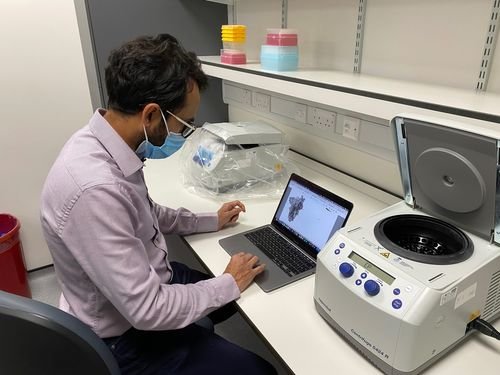Moderna, Pfizer test vaccine strategies against new variants

Vaccine makers Pfizer and Moderna are trying to get out ahead of some of the new coronavirus variants that are causing concern around the world.
Although there’s no evidence people immunized with either vaccine have less protection against the variants, both companies said they have started looking at ways to account for evolving mutations.
Especially worrying is the B.1.351 variant first seen in South Africa. It carries a mutation that helps it elude the body’s immune response to infection. The B.1.1.7 variant first seen in the UK is also causing concern, as its mutations appear to make it more transmissible, so it spreads better, and it may also cause more severe disease.
Researchers are also finding variants across the US that have developed mutations that help them evade the immune system.
Pfizer and its partner BioNTech said Thursday they have begun to test how well adding a third dose of their authorized vaccine might protect against new variants.
The study will look at the safety and immune response of a booster dose in up to 144 participants from the earlier Phase 1 trial in the US, including a subset of older adults up to age 85. It will also involve testing how well their antibodies are able to neutralize “strains of interest” in the lab, the companies said.
Volunteers would receive a third dose between 6 to 12 months after their earlier two doses. The dosage would be identical to what’s currently authorized: 30 micrograms.
“This booster study is critical to understanding the safety of a third dose and efficacy against circulating strains,” Pfizer CEO Dr. Albert Bourla said in a statement.
Separately, Pfizer and BioNTech are also “in ongoing discussions with regulatory authorities” about potentially testing a vaccine modified to protect against concerning variants in a Phase 1/2 study.
However, Bourla noted the companies haven’t yet seen compelling evidence that variants are resistant to its vaccine, though they are taking steps to be prepared.
Moderna said late Wednesday it has produced an updated version of its Covid-19 vaccine to help it combat the B.1.351 variant first seen in South Africa. Initial doses have been shipped to the National Institutes of Health for a clinical study.
The new vaccine, called mRNA-1273.351, will be evaluated as a booster shot for people who have already been vaccinated against coronavirus and as a primary vaccine for people who haven’t had coronavirus and have yet to be vaccinated.
Moderna said it will also evaluate a “multivalent” booster shot that combines the new vaccine formulation with the current vaccine.
Additionally, the company said it has begun to test whether a third, lower dose of its current Covid-19 vaccine can increase immunity against coronavirus variants of concern, with some study participants already getting third doses.
“We are moving quickly to test updates to the vaccines that address emerging variants of the virus in the clinic. Moderna is committed to making as many updates to our vaccine as necessary until the pandemic is under control. We hope to demonstrate that booster doses, if necessary, can be done at lower dose levels, which will allow us to provide many more doses to the global community in late 2021 and 2022 if necessary,” Stephane Bancel, Moderna’s CEO, said in a statement.
Moderna did not say how long it expects the studies to take, or when the new vaccine would be available, if authorized. The current vaccine calls two 100 microgram doses spaced about a month apart. The new booster doses are being evaluated at half that level and lower.
On Monday, the US Food and Drug Administration announced new guidelines that would streamline and speed the process of updating vaccines to target variants. An agency official estimated this could involve a several hundred individuals and take a few months.
“It’s going to be on the order of a few hundred individuals in terms of size and we’d expect that that might take a few months,” Dr. Peter Marks, director of the FDA’s Center for Biologics Evaluation and Research, said during a call with reporters on Monday.
Both Moderna’s and Pfizer’s vaccine use a new technology using messenger RNA or mRNA that simply requires a genetic code. The design is meant to make the vaccines easy to update quickly, without the months of preparation needed to change an influenza vaccine, for example.